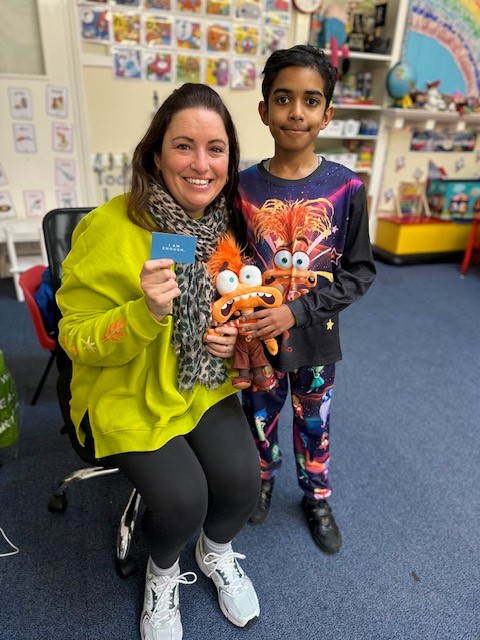

Mental Health & Wellbeing
 The World Health Organisation’s definition of mental health and wellbeing is: “a state of wellbeing in which every individual realises his or her own potential, can cope with the normal stresses of life, can work productively and fruitfully, and is able to make a contribution to her or his community”.
The World Health Organisation’s definition of mental health and wellbeing is: “a state of wellbeing in which every individual realises his or her own potential, can cope with the normal stresses of life, can work productively and fruitfully, and is able to make a contribution to her or his community”.
At Loyola, we are committed to fostering a nurturing and supportive environment where every child feels valued, safe, and able to thrive. When students feel good about themselves, they are more likely to succeed in their studies, build positive relationships, and manage challenges effectively.
We take a whole school approach to promoting the wellbeing of all of our community and ensuring that pupils and staff are positive, resilient and able to deal with the stresses of our modern world by focusing on four key areas:
| Emotional Wellbeing | We promote emotional resilience and mental health by encouraging children to express their feelings, talk about challenges, and seek support when needed. Our dedicated staff are always available to listen and provide guidance. |
| Physical Wellbeing | Physical health plays a vital role in overall wellbeing. Through PE lessons, active playtimes, and health education, we encourage children to lead active lifestyles and develop a positive relationship with their bodies. |
| Social Wellbeing | Building positive relationships is essential for happiness and confidence. We create opportunities for pupils to develop social skills, work collaboratively, and practice kindness and empathy towards others. |
| Mental Wellbeing | Mental health is a priority at our school. We teach children mindfulness, stress management, and problem-solving techniques to help them cope with any challenges they may face, both inside and outside the classroom. |
Open Communication
We provide an environment where children feel safe and comfortable talking to adults about any worries, difficulties or concerns they may have. Children know that they are listened to and that they will be treated with love and respect.
We have a robust system for reporting concerns (CPOMS), ensuring that important information reaches the safeguarding and pastoral team quickly and effectively. Staff are well-trained in safeguarding.
Support
Support Staff
We have a Senior Mental Health Lead, who works closely with our Head of Inclusion/Pastoral Support and dedicated staff to support our children who are facing difficult times. Brentwood Catholic Children's Society provides one-to-one counselling and in-depth training programmes to children, parents and staff in our school.
Wellbeing Strategies 
We have a wellbeing day once per half term, allowing the pupils to develop skills in meditation, breathing techniques, positive affirmations and more. A drop in lunchtime session is also available for pupils and staff.
Zones of Regulation
This framework, used across the school, develops awareness of feelings, energy and alertness levels while exploring a variety of tools and strategies for regulation, prosocial skills, self-care, and overall wellness. It is an easy way to think and talk about how we feel on the inside and sort these feelings into four coloured zones. The simple, common language and visual structure of The Zones of Regulation helps make the complex skill of regulation more concrete for learners and those who support them.
Healthy Eating & Active Living
We emphasise the importance of nutrition and physical activity through healthy eating campaigns, healthy lunch options, regular PE lessons and extracurricular activities.
Buddy System: New students are paired with older 'buddies' who help them adjust to school life and make friends. Class prefects (year 6 pupils) are teamed up with classes to support them.
Restorative Approach
We have a restorative and relationship-focused approach to behaviour. Children are encouraged to take ownership of their behaviour, to be reflective and think about the effect their behaviour has on others and to suggest how they can put right any wrongs they may have done. We see behaviour as communication and seek to understand the underlying reasons and feelings that may be at the root.
Pupil Voice and Leadership
It is essential that pupils are listened to and have a sense of responsibility. This helps to promote a sense of self-worth and to encourage children to be actively involved in their community.
We have a School Council and Eco Council with representatives from all year groups from Pre Prep 1 to Rudiments to make contributions to the life of the school.
Other leadership roles include:
- Play leaders
- Class prefects
- Mentors & Buddies
- Wellbeing Prefect
Roles and Responsibility
All classes have positions of responsibility with our youngest in Kindergarten being line leaders or prayer monitors and as they move through the classes responsibilities increase.
Each class from Pre Prep 1 upwards is represented in our School Council and Eco Council by two representatives.
We expect our older pupils to exemplify all that Loyola stands for. We award them the responsibility and roles of Head Boy, Deputy Head Boy, Senior prefects, House Captains, other prefect roles including play leaders and class buddies to help our younger students
It is a great honour to represent our school with such responsibility and our pupils rise to the challenge admirably when they are promoted each year.
How Parents Can Support Wellbeing
We believe that wellbeing is a partnership between the school and families.
Here are a few ways parents can support their child's wellbeing:
- Encourage open communication about their day and feelings.
- Promote healthy habits like regular exercise and balanced meals.
- Provide a routine that ensures enough rest and downtime.
- Stay engaged with the school’s wellbeing programs and attend workshops aimed at supporting mental and emotional health.
Support for Pupils
If your child needs additional support, we offer:
- Access to our pastoral lead
- One-on-one sessions with our school counsellor
- Tailored support plans for children facing particular challenges, whether emotional, social, or academic.
Contact Us
For more information or if you have any concerns about your child's wellbeing, please contact either the class teacher, (please use the class email address), Head of Inclusion crichardson@loyolaprepschool.co.uk, Head of Wellbeing vfoster@loyolaprepschool.co.uk or the Headteacher head@loyolaprepschool.co.uk
Loyola is dedicated to creating a happy, healthy, and safe learning environment where every child can reach their full potential.
